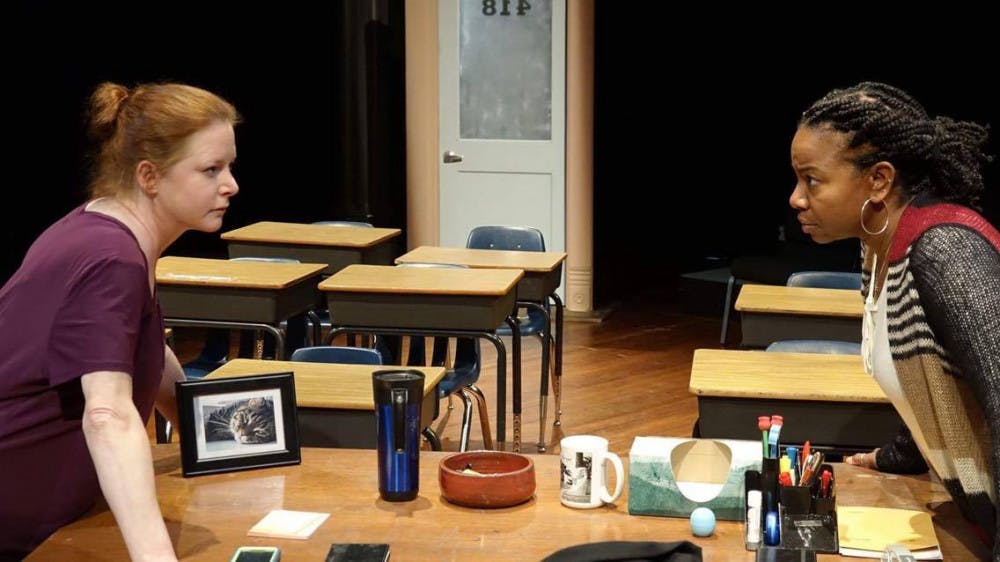From Sept. 8 to 11, Mercer Theatre brought Johnna Adams’ Gidion’s Knot to the stage at the Tattnall Square Center for the Arts — and what a rollercoaster ride it was!
The play revolves around the mystery of the death of Gidion, a young public school student. Teacher Heather Clark (played by Kelly Mann) and Gidion’s mother Corryn Fell (played by Sheri Gilbert Wilson) exchange volatile ideas in Clark’s classroom during a parent-teacher conference as they delve further into the ghastly circumstance surrounding Gidion’s suicide, which was coolly dropped on us ten minutes into the play.
That which followed was not a fallout — it was the raw ingredient of a tragic hero. Jealousy and contempt, scandal and rebellion, courage and cowardice in life and death swung back and forth between Mann and Wilson like a chaotic pendulum, the micro-grandiose of a two-person play in its full glory. You know it when you see it.
The props, as per Mercer tradition, tended towards minimalism, yet a simple array of desks just brought on the smell of a classroom. The desks were borrowed from Alexander II Magnet School; you can’t beat the real stuff! The teacher’s desk was well-decorated, though the lack of a computer struck a discord from the play’s contemporary setting. The student project-filled classroom walls, on the other hand, were condensed to a rectangle at one corner. This part of the set lacked volume, but was well-made to serve its theatrical purpose.
The two actresses presented the plot with superb authenticity. Wilson delivered her lines with such intense sorrow and anger that I felt as though I was watching a heated debate. There were occasional slightly awkward moments at the beginning, but they faded as the plot built up. Mann, whose character was always on the defense, shone by holding her composure in a moment of freefall de-escalation as the audience laughed at the imminent death of her cat.
The play runs for about an hour and a half, and it was no small challenge to cram all the ups and downs of the play into such short timeframe. The sharp contrast of tones as the discourse rapidly flowed from gods to family, from poetry to life, made the suspicion that Fell has bipolar disorder a lingering afterthought.
The best thing about this play was its manifold conflicts. For example, it first appeared as though Fell simply blamed Clark out of emotional necessity. However, after reading a note from Gidion’s classmate Seneca, Fell revealed that she hates the insincerity of everyone in the school, who would rather conform to the perceived “good” standard than to act out of natural inclination. Her interpretation of Gidion’s poetic violence is in stark contrast with Clark’s view that children should be protected against the inevitable loss of innocence.
Fundamentally, one seeks to embrace all that is to come as inevitability while the other desperately struggles to avoid the very things which she views as calamities.
At the end of the adventurous trip, the phone rang in darkness, leaving only a ray of light to shine over Gidion’s desk. I was seized by this moment, unable to decide how I felt about it. But only as I smelled the tepid air of Macon in the evening did I realize how incredible this experience had been.
“Gidion’s Knot” is a thought-provoking start to the Mercer Theatre season

Kelly Martin Mann, left, and Sheri Gilbert Wilson, right, took on a harrowing story of child suicide and the modern public school system in “Gidion’s Knot.”



